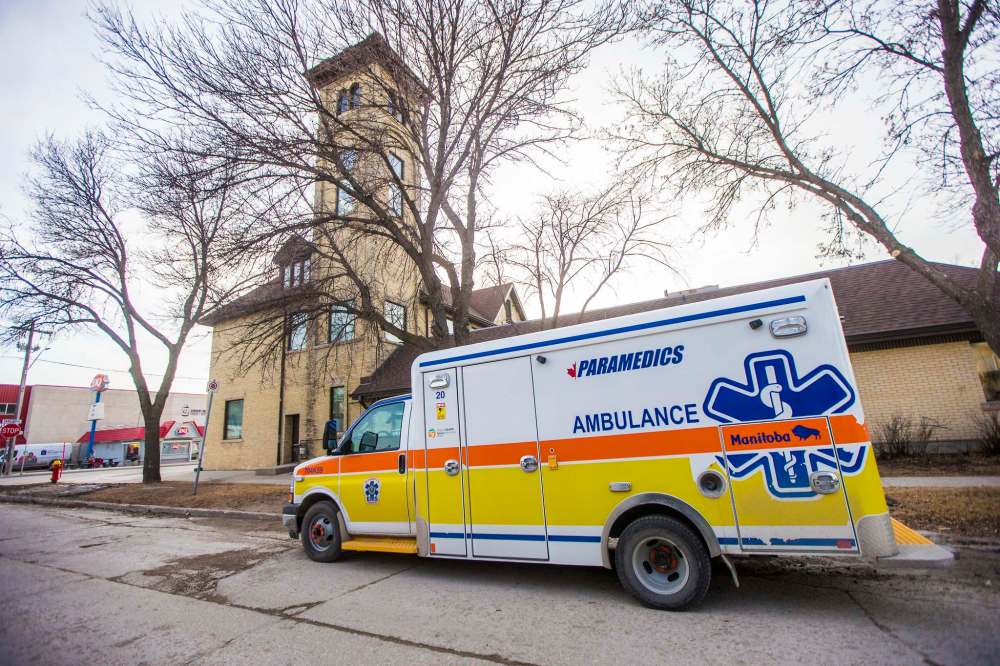Two-hour waits for ambulances in Winnipeg
Advertisement
Read this article for free:
or
Already have an account? Log in here »
To continue reading, please subscribe:
Monthly Digital Subscription
$1 per week for 24 weeks*
- Enjoy unlimited reading on winnipegfreepress.com
- Read the E-Edition, our digital replica newspaper
- Access News Break, our award-winning app
- Play interactive puzzles
*Billed as $4 plus GST every four weeks. Offer only available to new and qualified returning subscribers. Cancel any time.
Read unlimited articles for free today:
or
Already have an account? Log in here »
Hey there, time traveller!
This article was published 16/09/2021 (1265 days ago), so information in it may no longer be current.
Staffing is so stretched and resources are so taxed that some Winnipeggers are forced to wait hours for an ambulance and hospitals have no option but to turn away ambulances.
“We have seen wait times for lower-acuity patients of up to two hours, sometimes longer,” Christian Schmidt, chief of the Winnipeg Fire Paramedic Service, told the protection committee Thursday.
The consolidation of Winnipeg’s emergency departments from six to three has increased transportation times, Schmidt said. The city is growing and substance abuse in increasing, he added — yet, there hasn’t been net new ambulance resources in a decade.

“We’ve had instances recently where… because of the pressures of the system, the crews have actually been advised on arrival at the hospital, the hospital cannot accept the patient, and the crew is asked to transport elsewhere,” Schmidt said.
In addition to patients with COVID-19, hospitals are seeing Manitobans who’ve held off getting medical attention during the pandemic but can’t wait any longer, Dr. Rob Grierson told councillors. This can lead to ambulances being redirected.
Response times have also increased because of pandemic precautions, such as layering up in personal protective equipment.
Some WFPS employees have filled other pandemic-related roles, at vaccination centres and isolation sites. Calls for overtime go unanswered.
“Our folks have been working flat-out here for the entire pandemic response, and there are times where people simply need that rest,” Schmidt said. “When that overtime phone call comes, they’re physically and mentally, in some cases, not able to accept that call.”
There hasn’t been a spike in WFPS members retiring, Schmidt said. However, long waits for ambulances have affected firefighters (they normally arrive on scene before paramedics).
“Having a unit tied up with a patient for two hours, that unit is not available for other work,” Schmidt said.
Last October, the WFPS and councillors, including Sherri Rollins (Fort Rouge-East Fort Garry), called on the province to fund 10 new ambulances and another 120 crew members.
“They never got the job done,” said Rollins, protection committee chairperson.
Winnipeg operates its ambulance service, but the province foots the bill, which was $31.4 million last year.
In a statement, Shared Health said it has increased its investment in the WFPS by nine per cent over the past three years, to nearly $45 million. A spokesperson did not answer whether new ambulances were in the works.
“There’s no quick fixes with respect to the city’s problems,” Rollins said. “We need to start seeing a real commitment to investing in health care from the provincial government.”
Rollins said she emailed Health Minister Audrey Gordon about the issue in June and has only received a note acknowledging the email.
She also has a letter from former premier Brian Pallister, dated Aug. 31, inviting her to meet with Premier Kelvin Goertzen on the matter.
“We have a sick population. They really need to do something about their emergency rooms, and they really need to fund the 10 ambulances,” she said.
Between the emergency room consolidations, the drug epidemic, the pandemic and the strained health-care system, Winnipeg is facing a “humanitarian crisis,” Rollins said.
gabrielle.piche@freepress.mb.ca

Gabrielle Piché
Reporter
Gabby is a big fan of people, writing and learning. She graduated from Red River College’s Creative Communications program in the spring of 2020.
Our newsroom depends on a growing audience of readers to power our journalism. If you are not a paid reader, please consider becoming a subscriber.
Our newsroom depends on its audience of readers to power our journalism. Thank you for your support.
History
Updated on Friday, September 17, 2021 4:30 PM CDT: Clarifies wording re the consolidation of Winnipeg's emergency departments from six to three. The original wording said units instead of departments.
Updated on Sunday, September 19, 2021 11:35 AM CDT: Clarifies description of exchange between councillors.



